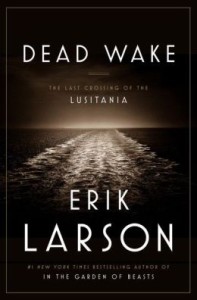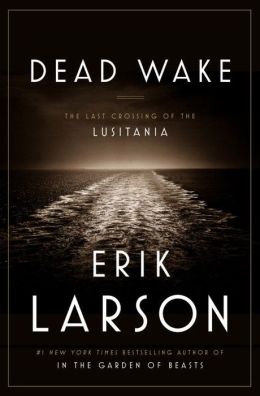
Think “ocean liner sinking,” and what comes to mind? The Titanic, of course. Yet the destruction of the Lusitania barely three years later, with the loss of nearly as many lives (almost 1,200), was far more consequential. When the German U-boat designated U-20 torpedoed the luxury liner just south of the Irish coast, sinking it in just 18 minutes, it set off a series of events that led to the entry of the neutral United States into the First World War, sealing the fate of the German and Austro-Hungarian empires. Erik Larson tells the tale of the last voyage of the Lusitania in lush detail in Dead Wake, bringing back to life many of the ship’s passengers and the U-boat captain as well, and casting a bright light on a little-understood chapter in American history.
Estimated reading time: 4 minutes
As Larson explains in a note about sources, he discovered layers of hidden drama and historical significance the more deeply he dug into the tale of the Lusitania. In Dead Wake he lays to rest many historical myths, such as the false impression created by high school history books that Woodrow Wilson rushed to declare war on Germany once the Lusitania had been sunk. (In fact, that came only two years later.) “But that,” he writes, “was just one of the many aspects of the episode that took me by surprise.” The energy of Larson’s prose conveys that sense of revelation. The book is strictly nonfiction but reads like a thriller.
Dead Wake: The Last Crossing of the Lusitania by Erik Larson (2015) 450 pages ★★★★★
In the final analysis, the sinking of the Lusitania was a tragedy that needn’t have happened:
- Had the ship’s departure from New York not been delayed because the captain’s niece overstayed her visit on board . . .
- had the captain, crew, and passengers not shrugged off the German warning published in a popular New York newspaper threatening to sink the Lusitania . . .
- had the British Admiralty (including First Lord Winston Churchill) informed the captain that two other ocean liners had just been sunk in the same waters where the Lusitania was sailing, or diverted four destroyers from the area where they might have protected the ship, assigning them instead to prevent an attack on one of their celebrated (and militarily useless) battleships . . .
- had the captain of the ship not ordered an unfortunate and unnecessary last-minute change of course . . .
- had passengers and some crew members obeyed orders and closed the portholes that admitted hundreds of thousands of gallons of seawater into the ship . . .
- had the single torpedo aimed at the ship malfunctioned like sixty percent of the torpedoes employed by the German navy . . .
the Lusitania would have sped without incident into Liverpool. In fact, a change in any one of these (or other) factors could have prevented the tragedy.
Surprising facts about submarine warfare
From an historical standpoint, the most interesting aspects of this story are the surprising facts about the nature of submarine warfare in World War I. For example, I’d never known that Britain had more submarines in service than Germany (though they kept the boats as coastal protection), or that the number of U-boats simultaneously hunting prey was vanishingly small, sometimes as few as seven boats. Nor was I aware that the Lusitania had been the fastest liner in the ocean, capable of cruising at twice the speed of German submarines. It’s also fascinating to read about the high-stakes arguments among the commanders of the German navy and their leaders in government. Apparently, it was not foreordained that Germany would practice unrestricted submarine warfare, or that, once undertaken, it would be carried so far.
About the author
Erik Larson has written some of the most remarkable historical nonfiction books of the past decade, including The Devil in the White City (about a serial killer who struck during the celebrated 1893 Columbian Exposition in Chicago), In the Garden of Beasts (about the US Ambassador to Nazi Germany and his lonely — and unsuccessful — crusade to move the State Department toward denouncing Hitler), and now Dead Wake.
For related reading
I’ve also reviewed three other excellent books by Erik Larson:
- In the Garden of Beasts: Love, Terror, and an American Family in Hitler’s Berlin (Why the U.S. failed to speak out against the rise of Hitler’s Germany)
- The Splendid and the Vile: A Saga of Churchill, Family, and Defiance During the Blitz (An intimate view of Winston Churchill in WW2)
- Isaac’s Storm: A Man, a Time, and the Deadliest Hurricane in History (The deadliest hurricane in history?)
You may enjoy browsing through 20 top nonfiction books about history.
If you enjoy reading history in fictional form, check out 20 most enlightening historical novels.
For more good books on the history of the US, see Top 20 popular books for understanding American history.
And you can always find my most popular reviews, and the most recent ones, on the Home Page.



























